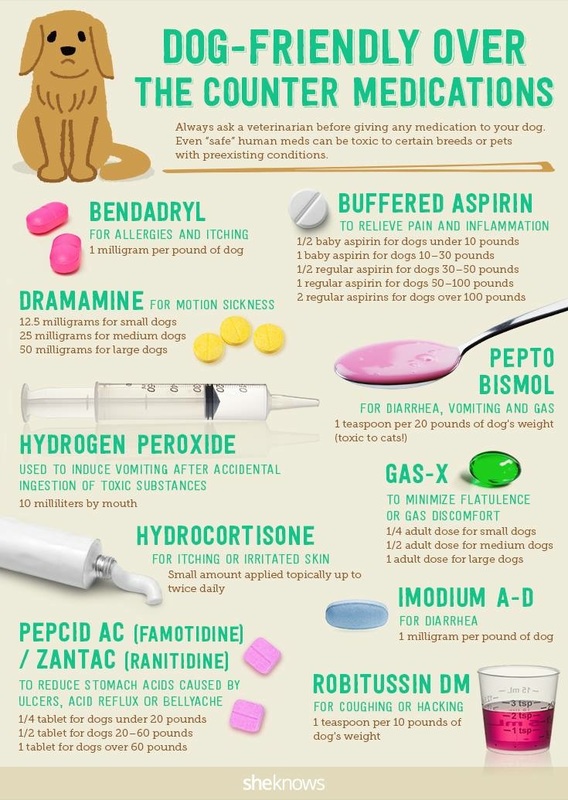1. Benadryl - We do use Benadryl for allergies or vaccine reactions, sometimes. However, some dogs shouldn't take Benadryl for other health reasons or because of other medications they are on.
2. Buffered Aspirin - NEVER give aspirin without calling your Vet first. Aspirin has dangerous interactions with some commonly used Veterinary medications (Rimadyl, Metacam, prednisone) and can change what medications we can use in your pet after you bring them in. For instance, even a single dose of aspirin can take 10 full days before the effects are cleared from the dog's system. We may tell you to give an aspirin in an emergency situation, but please, always call us before you do it.
Related Drugs - NEVER, EVER, give your dog or cat human anti-inflammatories
(Ibprofen/Motrin, Advil, Tylenol)
3. Dramamine - We will sometimes use this drug in a pinch for motion sickness, but we have better tools to control motion sickness in our pets. These tools are more effective and safer. Call us if your pet has issues with car rides - we can help!
4. Pepto Bismol - This drug can change how an x-rays looks if we're looking for a foreign body (it shows up bright white and blocks our view of everything else). It also can be metabolized similar to aspirin. Never give Pepto without checking with a Vet first, and always tell your Vet you gave Pepto before x-rays are taken.
5. Hydrogen Peroxide - we do use this drug to induce vomiting sometimes, but the dose is weight-dependent. Too much hydrogen peroxide can cause ulceration of the stomach and even perforation! Also, there are some toxins that should NOT be vomited. Always check with your Veterinarian before inducing vomiting.
6. Hydrocortisone - Applying this drug to a skin infection won't help heal an infection and may actually make things worse! We recommend you check with your Vet before applying anything topically to your pet.
7. Gas-X - This medication is of limited value in our furry friends. Gas in our pets typically has an underlying cause - sometimes a food allergy or bacterial imbalance. It's better to have your pet checked out if he/she has excessive gas than to throw a medication at it that may mask the symptoms of an underlying problem.
8. Immodium AD - This drug is DANGEROUS to breeds with a certain genetic trait (MDR1) that changes their metabolism of drugs. This is most commonly seen in collies and other herding breeds but can be seen in any dog. If given to a dog with the genetic change, Immodium can cause seizures, coma or death.
9. Pepcid AC/Zantec - We use these medications quite commonly in our patients, but again, the dose varies by size. This ad doesn't even specify what mg tablet size they are recommending! Pepcid AC comes in a 10 mg or 20 mg tablet. Always check with your Vet before giving your dog or cat Pepcid AC or Zantec. We will give you an appropriate dose, or help you decide whether Pepcid AC is likely to help your pet or not.
10. Robitussin-DM - Though this drug is safe for use in dogs, coughing is not a symptom that should ever be ignored. Coughing can be due to heart disease, heart failure, airway disease, asthma, heart worm disease, upper airway disease or cancer. Giving Robitussin DM could mask the symptoms (ie - slow the cough down) and thereby delay the pet from being seen by a Vet. By the time the pet gets seen, it could be a serious emergency situation. If your pet is coughing, please see a Veterinarian to find the underlying cause!


 RSS Feed
RSS Feed
